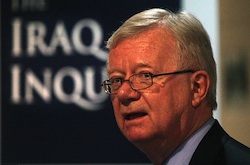Chilcot Inquiry Investigates Origins of Iraq War, including WMD Claims
November 24, 2009
Featured Image
Chilcot Inquiry into Iraq War Opens - The National [link]
- An official inquiry into Britain’s involvement in the Iraq War began today, promising a thorough investigation which could prove embarrassing for the government ahead of next year’s election.
- “We want to establish a clear understanding of the various core elements of the UK’s involvement in Iraq, and how these developed over time,” Sir John Chilcot said in an opening statement.
- A government dossier justifying military action included the claim that Saddam was capable of launching weapons of mass destruction within 45 minutes. No such weapons were found, leading to accusations the public had been deceived.
Lula Urges Iran Dialogue, Backs Nuclear Deal - Reuters [link]
- Brazilian President Luiz Inacio Lula da Silva urged his Iranian counterpart on Monday to engage in dialogue on nuclear non-proliferation but backed Iran's right to develop a peaceful nuclear program.
- Ignoring critics who fear closer ties with Iran could dent Brazil's ambitions on the global diplomatic stage, Lula met with Mahmoud Ahmadinejad in Brasilia on the first leg of the Iranian leader's South American tour, which also includes stops in Bolivia and Venezuela.
A Technical Evaluation of the Fordow Enrichment Plant - Ivan Oelrich and Ivanka Barzashka in Bulletin of the Atomic Scientists [link]
- Revelations about Iran's secret Fordow fuel enrichment plant have been seen as proof that Tehran is pursuing nuclear weapons.
- But the facility's small capacity makes enriching either reactor-grade or even bomb-grade uranium extremely time-consuming and impractical.
- Although it is significant that Iran has officially declared that there are no further secret nuclear facilities such as Fordow inside the country, it's possible that this facility could be one of several that has been either built or planned.
The Status of U.S. Nuclear Weapons in Turkey - Alex Bell and Ben Loehrke in Bulletin of the Atomic Scientists [link]
- In effect, U.S. tactical nuclear weapons in Turkey are without military value or purpose. That means removing them from the country should be simple, right? Unfortunately, matters of national and international security are never that easy.
- Preventing Turkey (and any other country in the region) from acquiring nuclear weapons is critical to international security. Doing so requires a key factor that also is essential to paving the way toward withdrawal of U.S. nuclear weapons: improved alliance relations.
- If the United States and European Union task Turkey with a bigger role in the diplomatic back-and-forth with Iran, it would help convince Ankara (and others) of Turkey's value to NATO and have the additional benefit of pulling Ankara into a closer relationship with Washington and Brussels. As a result, Turkey would obtain a stronger footing in alliance politics, contain its chief security concerns, and foster the necessary conditions for the removal of tactical U.S. nuclear weapons from Turkish soil.



